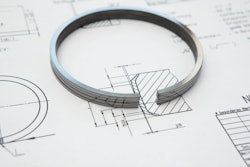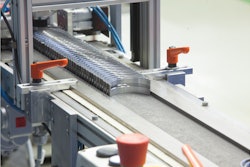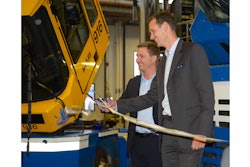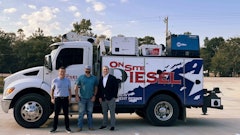Federal-Mogul Powertrain, a division of Federal-Mogul Holdings Corporation, has significantly reduced the friction of heavy-duty diesel piston rings by a combination of technologies, materials and designs, enabling vehicle makers to achieve lower CO2 emissions and improved fuel economy. In a breakthrough for ring performance, while reducing friction, the company has simultaneously improved scuff resistance and durability.
The focus on reduced ring friction is driven by its importance in reducing fuel consumption and CO2 emissions. Up to 10% of the fuel burned in a heavy-duty diesel engine is wasted through mechanical losses. Of these, one of the largest single contributors is friction between the ring pack and the cylinder bore, accounting for 25% of the total mechanical losses and around 4% of the vehicle fuel consumption.
"Friction between the ring pack and cylinder bore is influenced by three main factors: tangential ring forces, axial ring height and the coating on the edges of the ring running surface," says Gian Maria Olivetti, Chief Technology Officer, Federal-Mogul Powertrain. "We have used a combined approach to reduce friction from all three sources, while improving wear resistance to provide longer life and at the same time retaining and even improving its core function to seal the combustion chamber against the crankcase."
Federal-Mogul's approach to achieving friction reduction in these areas includes innovative technology, process and material solutions, including the company's DuroGlide piston ring coating; its patented LKZ piston ring and a vertical casting process combined with the use of a highly-refined GOE70 cast steel material.
DuroGlide: A Breakthrough in Coating Performance
Federal-Mogul's DuroGlide is considered a breakthrough in piston ring coating technology as it outperforms even existing premium products by providing the ultimate combination of low friction with exceptional durability even in the most critical engine environments. In testing, DuroGlide-coated piston rings demonstrated the highest durability of any piston ring coating type and improved fuel economy by up to 1.2%. DuroGlide also provides superior scuff resistance, making the technology particularly suitable for high performing, fuel-efficient engines where adverse lubrication conditions are generated by smoother cylinder bore surfaces, low viscosity oils, aggressive combustion strategies and very high temperatures.
DuroGlide's advanced material innovation is based on an amorphous high-hardness carbon-based coating, which prevents boundary lubrication contact between surfaces by providing a physically and chemically inert barrier. It contains diamond-structured carbon in a higher concentration than has been previously achieved (around 50%), giving exceptional hardness (up to 5000HV0.2) and measured wear rates as low as half that of the best existing piston ring coatings.
"Until now, the high durability carbon-based coatings available in the market have been typically restricted to a maximum of a few microns thickness because greater thicknesses increase residual stresses, leading to a higher risk of delamination," explains Dr. Steffen Hoppe, Director of Technology, Rings and Liners, Federal-Mogul Powertrain. "Additionally, good friction and wear performance requires very smooth coating surfaces which cannot be achieved with conventional surface finishing processes."
Federal-Mogul developed an innovative surface treatment and physical vapor deposition manufacturing process which results in a coating thickness of up to 25 microns without the risk of delamination. These process innovations enable use of the specialized coating on components with high contact pressure-like piston rings. The company has also implemented a special polishing process which provides an extremely smooth surface finish to further reduce friction. Several customers have contracted with Federal-Mogul for this technology and preparation for series production of DuroGlide-coated rings is currently underway.
Lower Tangential Forces
The tangential ring forces in Federal-Mogul's current products for a typical Euro 6 compliant heavy-duty diesel (Ø 130 mm bore) are around 100N, compared with 138N on the Euro 3 rated engines of just a few years ago. The company is currently developing solutions that will enable further reductions in tangential force to as little as 60N. To ensure low levels of oil consumption with such reduced tangential forces, Federal-Mogul developed its patented LKZ edge profile which combines a stepped surface and taper on its contacting edge, reducing friction by up to 20%, compared to the best conventional two-piece oil rings.
"Typical piston rings apply equal pressure to the cylinder bore on the downstroke, toward the crankcase, and on the upstroke, toward the combustion chamber," says Hoppe. "Our LKZ ring provides a greater effect during the downstroke, when it is needed to return oil to the oil pan, than it does on the upstroke and is so effective in pulling oil away from the combustion chamber, reducing oil consumption, that we are able to reduce ring tension and friction."
Thinner Rings, Stronger Material
Federal-Mogul has also reduced the axial height of piston rings from 3 to 4 mm to 2.5 to 3.5 mm on a typical Euro 6 engine, with further developments underway that will reduce future ring height to 2 to 3 mm. To ensure robust performance from thinner rings, the company developed a completely new, highly automated, casting process, optimized by an advanced simulation process to produce consistent, exceptionally high quality ring castings.
The optimized casting process provided the opportunity to simultaneously develop a more highly refined cast steel material, GOE70, with a tensile strength 50% higher than traditional nodular graphite iron rings. The new material entered series production during 2012 on a highly loaded, heavy-duty engine meeting Euro-6 emissions standards.
Looking forward, Federal-Mogul believes that ring friction can be cut by up to another 30%, equivalent to around 1.2% reduction in BSFC (Brake Specific Fuel Consumption) at road load conditions, and stresses the importance of working closely with customers. "The full potential of piston ring pack optimization can only be achieved when piston design, ring design, cylinder topography, cylinder distortion and other block parameters are all tuned to match each other," he says.
Federal-Mogul presented its range of piston rings at the IAA Commercial Vehicles Show in Hannover from September 23 to October 2, 2014, hall 13, stand C28.

















